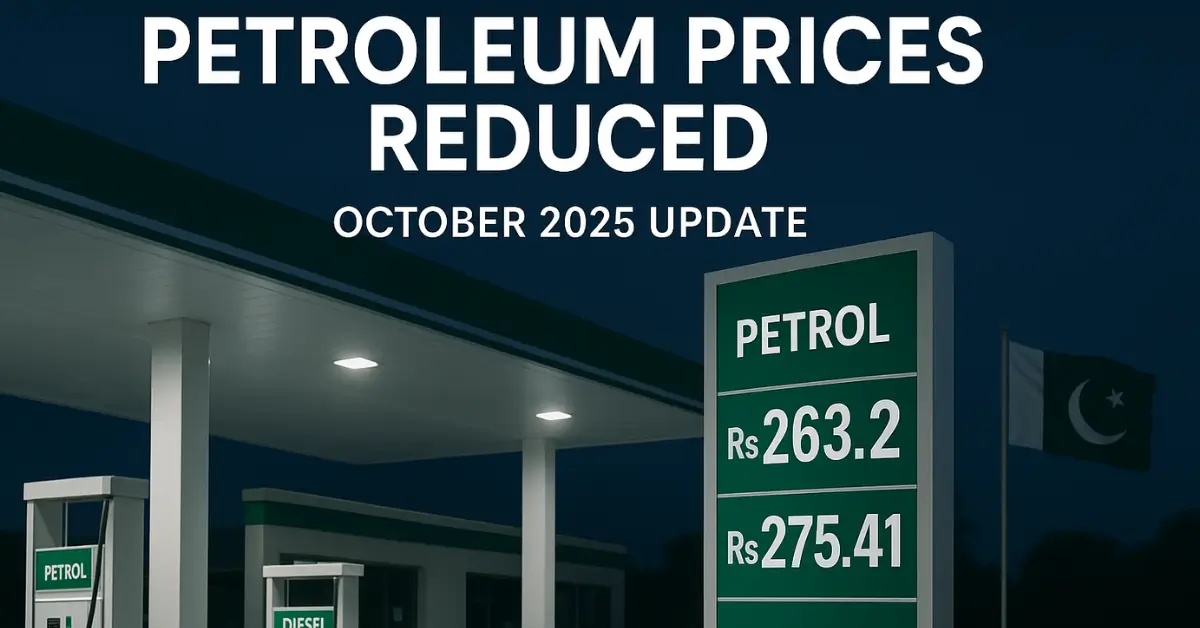Petrol Prices Slashed in Pakistan
In a move aimed at providing relief to consumers and easing the burden of rising fuel costs, the federal government has announced a significant reduction in the prices of petroleum products for the next 15 days. This decision, which comes into effect at midnight tonight, brings hope to millions of Pakistanis struggling with high fuel prices amid global economic pressures. Let’s dive into the details of the price cuts, their potential impact on the public, and what it means for the economy.
Key Details of the Price Reduction
The government has approved reductions across the board for all major petroleum products, as announced by the Ministry of Finance. The new prices, which will be effective for the next 15 days, aim to provide immediate relief to consumers:
Petrol Price Cut:
The price of petrol has been reduced by Rs 5.66 per liter. After this reduction, the new price of petrol will be Rs 263.2 per liter. This cut is significant, especially for individuals who rely on petrol for their daily commutes, offering some much-needed savings at the pump.
High-Speed Diesel Price Cut:
High-speed diesel, which is a primary fuel for heavy vehicles and machinery, has seen a reduction of Rs 1.39 per liter. The new price of high-speed diesel is now Rs 275.41 per liter. This reduction is expected to ease the operational costs for businesses in sectors like transportation, logistics, and agriculture.
BISP Survey Form 8171 – Complete Guide to Resume Your Rs. 13,500 Payment 2025
Kerosene Price Cut:
The price of kerosene, often used by lower-income households for cooking and heating, has been reduced by Rs 3.26 per liter. This means that the new price of kerosene will be Rs 181.71 per liter. For families in rural or underdeveloped areas, this price drop can help lower their overall household expenses.
Light Diesel Price Cut:
Light diesel, another important fuel used in various sectors, has been reduced by Rs 2.74 per liter. The new price will be Rs 162.76 per liter, providing some relief to those who rely on this fuel for their daily activities.
Government’s Approval and Notification
The decision to reduce the prices of petroleum products was approved by Prime Minister Shehbaz Sharif earlier this week. Following the approval, the Ministry of Finance issued a formal notification outlining the new prices and the timeline for the reduction.
This price cut marks a significant step by the government to tackle the high cost of living in Pakistan, especially during a period when fuel prices have remained volatile due to global market fluctuations and local economic challenges.
Google’s AI Plus Plan: A New Milestone for Digital Transformation in Pakistan
Duration of the Price Reduction
These new fuel prices will take effect starting at 12 midnight tonight, and the reduced rates will be applicable for the next 15 days. During this period, consumers can expect to pay lower prices for petrol, high-speed diesel, kerosene, and light diesel. After 15 days, it’s unclear whether the prices will remain the same or if another adjustment will take place. The government has promised to monitor the situation closely and make necessary changes based on market conditions.
Impact on Consumers and the Economy
Relief for Consumers:
The reduction in petroleum prices provides immediate relief to consumers, particularly those who rely on fuel for daily commuting and business operations. Petrol price cuts will help people save money on fuel costs, allowing them to use their income for other essentials, such as food, healthcare, and education.
For businesses that depend on diesel, such as transport companies and the agricultural sector, the reduction in diesel prices may help reduce overall operational costs, potentially leading to lower prices for goods and services.
Potential Economic Benefits:
In addition to benefiting individual consumers and businesses, the reduction in fuel prices could have broader positive effects on Pakistan’s economy. Lower fuel costs may help reduce inflationary pressures, which have been a concern for many households. As transportation and logistics costs decline, the price of goods and services could stabilize, providing a temporary relief from inflation.
Furthermore, the price cut could ease the pressure on industries that rely on petroleum products for their operations, making it easier for them to maintain profitability despite ongoing global economic challenges. This could help boost business confidence and potentially attract investment in key sectors.
Peshawar Introduces Direct Salary Payments from AG Office to Employees Accounts
Challenges Ahead:
While the price reductions are undoubtedly a welcome move, they are only a temporary solution. The government will need to address the underlying issues of fuel price volatility, including global oil market fluctuations and local taxation policies. Without long-term structural reforms, these temporary reductions may not be sustainable in the future.

